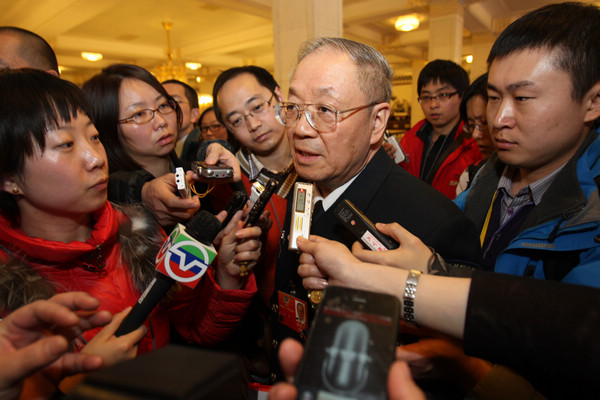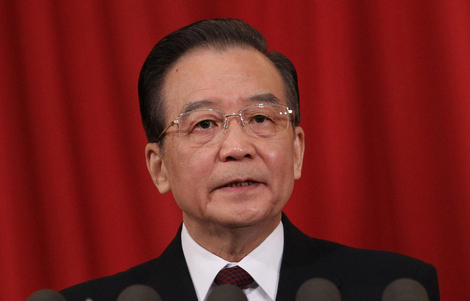 |
|
|
|
|||||||||||
China should set up a coast guard to cope with the "increasingly challenging" maritime disputes with neighboring countries, a top political adviser said on Monday.
At the annual two sessions, Luo Yuan, a member of the Chinese People's Political Consultative Conference National Committee and researcher with the Academy of Military Science, said a coast guard should be established in part from some of the existing agencies whose responsibilities include enforcing law in the South China Sea and East China Sea.
|
 |
|
Yin Zhuo, a military expert and member of the CPPCC National Committee, answers questions from reporters at the Great Hall of the People in Beijing on Monday. [Feng Yongbin / China Daily] |
Currently, at least six ministries are involved in maritime affairs - including Ministry of Public Security, Ministry of Transportation, Ministry of Land and Resources - as well as local governments.
Their duties cover such matters as maritime security, maritime pollution, maritime anti-smuggling and maritime disaster rescue.
Some of the departments in these agencies have overlapping duties, personnel arrangements and even equipment allocation, and their coordination is lax, Luo told China Daily.
Effectively integrating these resources into a coast guard will greatly reduce internal frictions and shorten the decision-making procedures, said Luo.
Luo, an outspoken senior military figure in China, made the remarks against the background of disputes between China and several of its neighbors intensifying in recent years over. These have intensified disputes regarding claims to territory of some islands and demarcation of some waters in the South China Sea and East China Sea.
The Philippines, Vietnam, Malaysia and Brunei dispute China's sovereignty over some islands and waters in the South China Sea, and Japan claims China's Diaoyu Islands as its own.
Meanwhile, the United States is increasing its involvement in Asia-Pacific affairs, saying it has a national interest in the peaceful resolution of disputes in the South China Sea, which has further complicated the disputes.
Cases have recently been reported of Chinese fishing vessels that in Chinese waters being expelled or their captains being arrested by foreign countries, yet the ships of China's fishery administration are not equipped to quickly and efficiently react to such emergencies.
The coast guard would be equipped to deal with these situations, giving the country more room to maneuver in such thorny cases, said Luo, adding that it has been a common practice for big countries to have such a force.
The US, Japan and Russia all have their coast guard.
Japan's coast guard has often engaged in expelling Chinese fishing vessels from the waters near the Diaoyu Islands.
Luo also advised the country to publish a South China Sea white paper of historical fact demonstrating China's long sovereignty over many islands in the sea.
China should have its legal, business and military presence in the South China Sea, station troops on the islands if possible, or clearly mark its sovereignty, flying national flags or having the naval vessels patrolling, Luo said.
Luo also suggested setting up a South China Sea special administrative region, with prefectures and counties for China's Nansha, Xisha and Zhongsha islands.
As more than 200 authoritative encyclopedias and maps across the world register the South China Sea as part of China, these facts should all be included in the South China Sea white paper, Luo said.
Yin Zhuo, a military expert, also said that the issues concerning the East China Sea and South China Sea should be solved through diplomatic, economic and legal means, and a military solution would not be our option for the future.
"But other countries should not take this the wrong way. If they think it is a sign of us showing weakness, they will be making a serious mistake," said Yin, also a member of the CPPCC National Committee.
You may contact the writers at wujiao@chinadaily.com.cn and xindingding@chinadaily.com.cn
Wu Ying, iPad, Jeremy Lin, Valentine's Day, Real Name, Whitney Houston, Syria,Iranian issue, Sanyan tourism, Giving birth in Hong Kong, Cadmium spill, housing policy

|

|

|

|

|

|